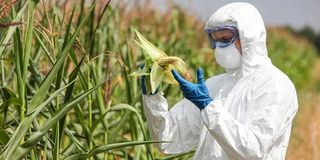Victor Oria: Won’t anti-GMO campaign ever end?

A professional examines GMO corn cob on a field. GM products take years to produce and undergo rigorous regulatory processes before being allowed on the market.
Opposition leader and former Prime Minister Raila Odinga recently criticised the government’s move to import genetically modified (GM) maize in a bid to address food shortages.
Addressing his supporters in Kilifi County, the veteran politician stated that the maize would have serious health effects on the consumers. He specifically claimed men would develop breasts and women develop testicles.
This coming from a leader of Raila’s stature and global repute is inexcusable. Unfortunately, the ‘mysteries’ about genetically modified organisms (GMOs) have become political fodder in Kenya with unproven claims.
No wonder, a study commissioned by the Alliance for Science reported that Kenyans are subjected to the worst misinformation globally regarding GM foods and products.
This political rhetoric and unverified claims hinder any meaningful discussion about the contribution of GM crops to the food basket. In a recent article, I suggested that meaningful conversations could only happen when we all agree to stop misinformation. Kenya is a food-insecure nation and GM technologies are part of the solution.
Genetic engineering offers a platform to develop locally sustainable solutions as we deal with perennial droughts, unreliable rainfall, emerging pests and diseases. For example, the stem borer affects all the maize varieties grown in coastal counties such as Kwale and Kilifi.
Pesticide use is yet to solve the problem as the pests quickly develop resistance. Moreover, the ever-rising costs of pesticides are prohibitive to most small-scale farmers in the region.
The proposed adoption of insect-resistant Bt maize is a timely solution to the stem borer problem. Unsubstantiated statements about GMOs primarily focus on their safety—the same talking points used by anti-GM non-governmental organisations in the country—yet no scientific evidence shows that the foods are unsafe for consumption.
GM products take years to produce and undergo rigorous regulatory processes before being allowed on the market. In the United States, agencies such as the Food and Drug Administration (FDA), Environmental Protection Agency (EPA) and Department of Agriculture (USDA) must certify their safety before consumption by humans and livestock.
In Kenya, similar regulators must approve the cultivation and consumption of GM products. They include the National Biosafety Authority, National Environment Management Authority, Kenya Plant Health Inspectorate Services, and Kenya Bureau of Standards.
Feed them to livestock
Even if these agencies were the most incompetent, I am confident they would never approve food products that can make consumers grow breasts, beards or testicles. If GM products are so unsafe, why do we feed them to livestock?
Animals, too, have rights and deserve to be treated with dignity. In the US, 95 per cent of livestock consume GM fodder. There are no reports of female animals developing male genitals or the male's breasts.
Research shows no difference in quality, safety and nutritional value of animal products like eggs, meat and dairy between animals that consume GM and non-GM feeds. In the European Union, over 60 per cent of animal feeds are imported from Argentina, Brazil and the US, which mostly grow GM corn and soybean for livestock. Other studies show the safety and health of animals are the same whether they eat GM or non-GM fodder.
Another unfounded claim by some politicians, NGOs and grassroots organisations is that GM crops will replace conventional ones, hence multinational companies overpowering small-scale farmers and local food markets. Parliament, the State Law Office and regulatory agencies ensure adoption of GMOs follows the law.
Moreover, the blanket statement is, at best, misleading. We should discuss the specific GM crop—such as maize, cowpeas, cassava and sweet potatoes—and the modification they have undergone. No scientist will spend time and money to modify a crop that will not solve a problem.
Secondly, no government or funding organisation, no matter their generosity, will fund such a venture. In Kenya, many GM crops are under research and development targeting specific problems, such as potatoes resistant to late blight disease and drought-tolerant maize. This is funded by the taxpayers and is primarily done by the Kenya Agricultural and Livestock Research Organization (Kalro) in conjunction with public universities and other agricultural research institutions.
We need to move away from the emotions of the moment and accept our reality. Even as we pronounce unfounded claims about GM products, there are thousands of Kenyans facing perennial starvation. Actually, the media should give more attention to Kenyan scientists working on GM crops to provide information based on evidence rather than reporting on hollow statements by politicians.
Dr Oria, PhD, is a LEAD Fellow, Prof Janine Erler Research Group, Biotech Research and Innovation Centre, University of Copenhagen, Denmark. [email protected]. @Nyuka_Bel




